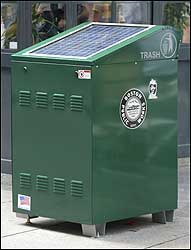Solar-power compactors press the mess in Boston
By Matt Viser, Globe Staff | July 26, 2006
They're boxy and green and, at first glance, don't even look like garbage cans; as Mayor Thomas M. Menino demonstrated their use yesterday, some people downtown mistook them for mail drops or traffic-light switch boxes.
They are Menino's latest idea for keeping the city litter-free: solar-powered, self-compacting trash receptacles. Delivering a rant about overstuffed trash cans, while trying to scrape gum off the bottom of his shoe at a Downtown Crossing unveiling, Menino described the virtues of the new devices. They need emptying only once or twice a day, not the 15 or more sanitation worker visits required by some downtown trash cans. They don't spill. They smell less. And, they hold some 150 gallons of trash, about five times more than a standard city receptacle.
Developed by a Jamaica Plain inventor, they are powered by photoelectric panels, which supply power to motor-driven compactors inside. Workers extract neat, 40-pound trash bricks instead of trying to manhandle the messy contents of an overflowing can.
``I think they're great," Menino said.
The city has placed 50 of the $4,300 machines in neighborhoods and hopes to buy more as it gauges how much it can save in labor costs.
The 4-foot-tall containers announce ``TRASH" in four places and feature several images of a person tossing an item into a can. Even so, some passersby cast quizzical looks yesterday at the machines, which could easily be mistaken for drop boxes for library books or postal packages.
``We don't want people putting their tax forms in there," joked Timothy McCarthy, an aide to the commissioner of public works.
Sensors inside the receptacle detect when the trash has reached a level needing compacting. The sensors trigger a motor that drives the compactor (with the type of chains made for Harley-Davidson motorcycles). As more trash is added, the process is repeated until the receptacle is full.
The invention, called the BigBelly, is the brainchild of James Poss and some of his Babson College business school classmates. Poss, whose other inventions include a pair of shoes to strengthen ankle joints, said he has received dozens of e-mails from friends who work downtown and are admiring his handiwork.
``I've been an aspiring inventor for at least a decade," said Poss, who is president of the Needham-based Seahorse Power Co. ``My wife and my mom said this was my best idea yet."
The company's first solar-powered trash compactor was installed in Vail, Colo., in 2004. There are now more than 200 of the bins worldwide, including in Vancouver; Cincinnati; Queens, N.Y.; Needham; Newton; and Worcester.
Boston got the newest model, the third generation of the trash compactor, which is more energy efficient than the previous versions. This model also has an electronic eye that trips the compactor and increased capacity in the solar panels, allowing them to store enough power to run for several weeks without sunlight.
The compactors have three lights on the front panel: Green means the bin is working and has room for more trash; yellow means it is almost full; and red means it is full. The company is working on a tool that would send city workers a text message or a wireless signal when the bin is full, but right now, workers have to go by periodically to check the status of the bins.
The compactors were installed about a week ago at several locations: five at Boston Common and Faneuil Hall, and 10 each at Downtown Crossing, Mattapan Square, Newbury Street, and Boylston Street. In the last week, barrels that used to average pickups four times a day now average once every other day, McCarthy said.
There appeared to be a learning curve for those looking to throw things away. Downtown, people circled the bins and cautiously opened the large pull-out door. Once it is opened, items are placed on a platform, which opens into the bin when the door is closed. It means people have to use two hands to toss their trash. It also means that once something has been thrown away, it is difficult to retrieve.
People in other cities have lost wallets and cellphones in the bins and had to use the number printed on the boxes to call city workers and have them find the lost items.
One thing the receptacles cannot do is make people take the time to throw things away. Yesterday, several passersby tossed cigarettes, matches, and candy wrappers on the ground, rather than deposit them in the trashcan . Others avoided trying out the unfamiliar bin and instead put trash on top of it.
Not everyone was immediately impressed with the city's thinking in spending on expensive, high-tech trash cans, either.
``The question is: Why?" said Ed Swindelles, a software engineer. ``I think it's a big waste of money."
Still, there were some fans.
``It's good," said Jerry Caldwell, who had just tossed a Coke can into the bin. ``Maybe it'll keep trash from blowing around everywhere. This is normally a mess."
Several tourists posed for pictures in front of them.
``I'm more impressed with the public toilets," said Julia Gleason, referring to the coin-operated, self-cleaning restrooms. ``But this comes a close second."


